Pitfalls when hiring a rental car

Tricks of the rental car companies
In recent years, the topic of "hire cars" has repeatedly been the focus of media coverage and politics. Young men in particular rent fancy, sometimes highly motorised, sports cars for the weekend, fulfilling a childhood dream - at least for a short time. Many a "drive" ends in an accident, as inexperienced sports car drivers in particular underestimate the power of the vehicle and lose control.
Even in the absence of an accident, rental car companies sometimes demand high compensation payments (usually payment of the excess) from customers following a rental. They claim that "damage" to the vehicle was caused by the customer (renter) during the rental period.
Here is an example case from practice:
I. Email from the tenant (established change in condition)
The rental company sends the customer an email after the end of the rental agreement and informs them that a deviation in the condition of the rental vehicle has been detected. At the same time, the customer is asked to comment on the "detected" condition deviation.
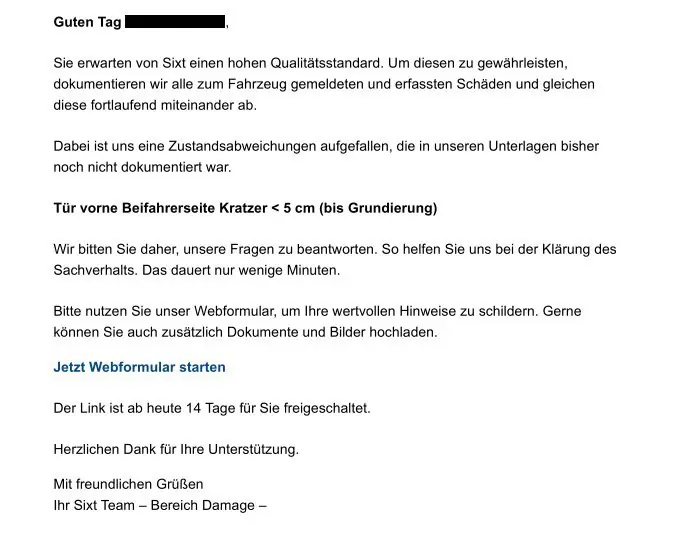
In our example case, the client stated that he had no knowledge of a deviation in condition and referred to the rental agreement, according to which the disputed area on the vehicle had unrepaired previous damage anyway.
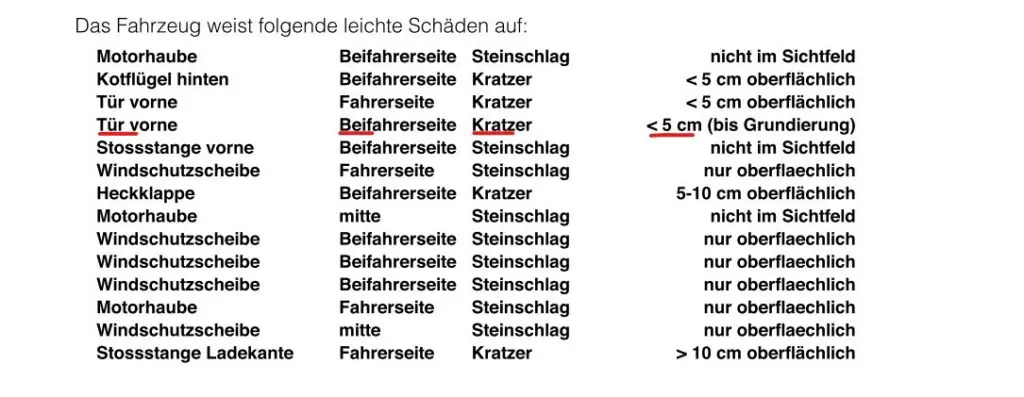
II. Letter of claim from the rental company including repair cost calculation and invoice
After about two weeks, the customer receives a letter of claim (e-mail) from the rental company together with an enclosed repair cost calculation from TÜV and an invoice for EUR 1,300.00.
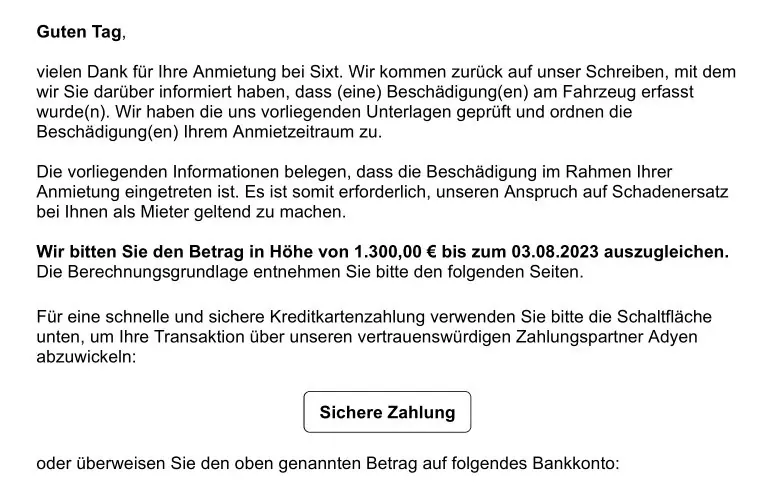
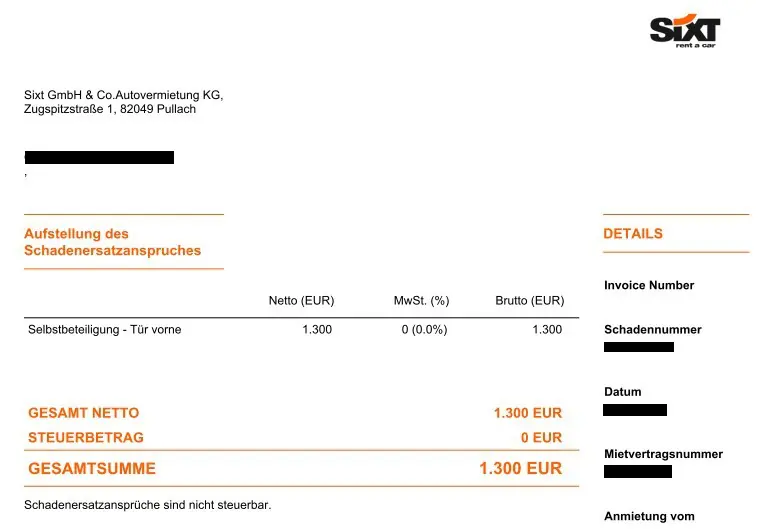
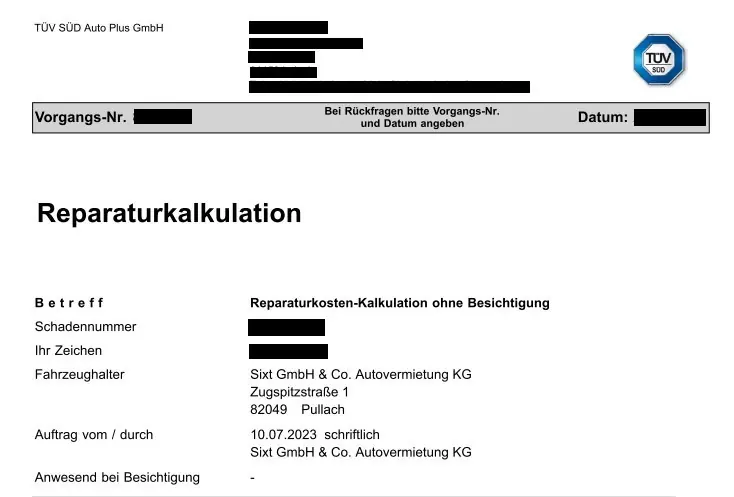
1. repair cost calculation instead of expert opinion
Firstly, it is noticeable that the commercial rental car companies only submit a repair cost calculation.
A calculation is not an expert opinion. In a repair cost calculation, the contractor - in this case the TÜV - merely determines the expected costs of repairing a motor vehicle. Existing unrepaired previous damage is not taken into account, as it has no bearing on the repair costs.
This is different in the case of a damage report. When determining damage, it is also important whether or not there is unrepaired previous damage.
If a new damaging event merely leads to a previous damage being further intensified without this resulting in increased, definable repair costs, the injured party has not suffered any damage under substantive law.
However, when reading a repair cost calculation, a legal layman gets the impression that it has the same quality as an expert opinion, which is objectively not the case.
2. picture of the "damage"
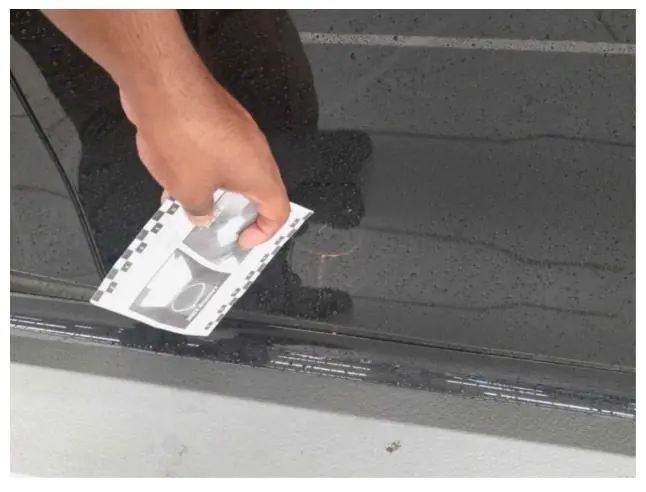
If you take a closer look at the photograph of the "detected" change in condition, you will notice that it is barely recognisable to the naked eye. Instead, the change in condition gives the impression of a stone chip. From a legal perspective, this plays a not insignificant role (see below).
3. Invoice instead of response to the client's objection
Furthermore, it is striking that the lessor does not respond to the customer's indication that the vehicle in dispute had unrepaired previous damage.
III. Evaluation of the legal situation
1. trace of use or "damage"
In German tenancy law, the provision of Section 538 BGB applies. It states:
„The tenant is not responsible for changes to or deterioration of the rented property caused by use in accordance with the contract.“
The provision states that a tenant is not liable for changes in condition that occur as a result of use in accordance with the contract. Such changes in condition are deemed to be compensated for with the payment of the rent. In such a case, the owner is therefore not entitled to claim damages for any deterioration in condition.
In our example case, the light image already shows that the change in condition is so small that there is much to suggest that it is a stone chip. If a motor vehicle is driven on the road, it is exposed to external weather conditions. In particular, a motor vehicle can be hit at any time by small objects thrown up by other road users. These include small stones in particular.
A tenant is generally not liable for changes in condition that are unavoidably caused by stone chips.
2. compensability of the damage
If there is a change in condition that exceeds the threshold of Section 538 BGB, the owner is not entitled to claim damages from the tenant even if, in addition to unrepaired previous damage, there is further non-differentiable damage that does not result in increased repair costs.
In our example case, the area of the vehicle in dispute (passenger door) already had unrepaired previous damage (scratch). The "new" scratch would therefore merely have been added to the existing damage. Repairing the previous damage would automatically remove the "new" scratch without requiring any additional repair work. Technically, a scratch is usually repaired by completely repainting the affected part of the vehicle.
A different result would lead to an injured party being overcompensated at the expense of the damaging party. The commercial rental car companies could otherwise "cash in" for any further damage (scratches) without ever having to have the vehicle repaired.
In our example case, this would otherwise mean that Sixt could always demand the excess from the respective lessee of a vehicle for each additional scratch - assuming a limitation of liability was agreed.
IV. Outcome of the example case
In our example case, the rental car company Sixt had no legal claim for payment against the renter. There was neither a change in condition that exceeded the threshold of Section 538 BGB, nor was there any compensable "damage" due to the lack of repair of the previous damage.
Finally, the customer received the following message from Sixt:
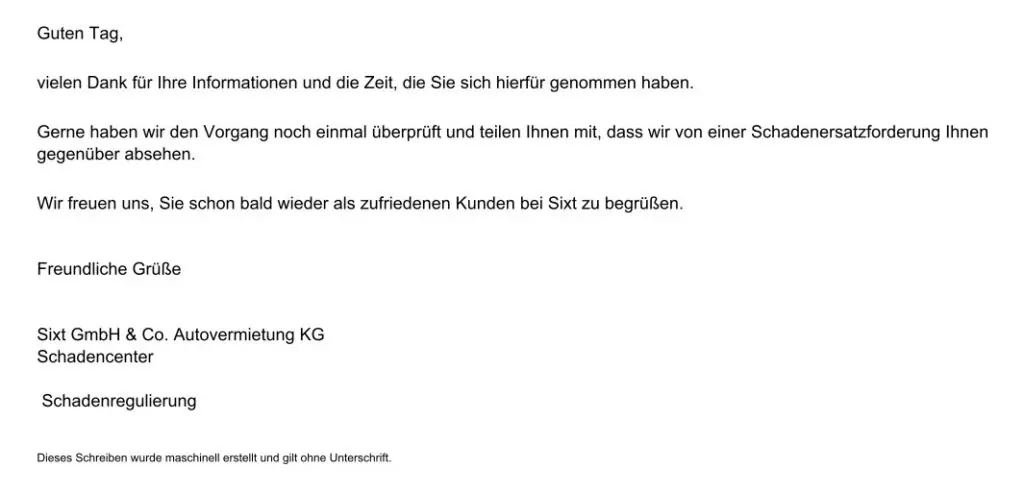
V. Conclusion
We can only advise everyone not to make any hasty payments to the lessor following a car hire. In individual cases, a lawyer should always check the facts of the case before any payments are made. Commercial rental car companies maximise their profits by making unjustified claims for damages. If you do not want to be part of this scam, we recommend the following behaviour when renting a car:
- Fertigen Sie bei Übernahme des Fahrzeuges Lichtbilder und Videos vom Fahrzeug an. Schalten Sie notfalls Ihr Handylicht ein, sofern die Lichtverhältnisse gute Aufnahmen nicht erlauben. Nehmen Sie ein Video auf, während Sie einmal von außen um das Fahrzeug langsam herumlaufen. Achten Sie darauf, dass man auf dem Video jeden Winkel des Fahrzeuges gut erkennen kann. Ein verwackeltes Video ist genauso nützlich, wie überhaupt kein Video. Machen Sie Lichtbilder vom Kilometerzähler sowie vom Tankstand des Fahrzeuges. Dokumentieren Sie auch, ob der Innenraum des Fahrzuges irgendwelche Beschädigungen oder Verschmutzungen aufweist.
- When returning the vehicle, proceed in the same way as when picking it up.
- Do not listen to any of the rental company's employees who try to tell you that it is not necessary to take photos or videos. If there are any complaints afterwards, you will be left holding the bag.
Tolga Topuz
Lawyer
Topuz Law - Law firm from Düsseldorf -
